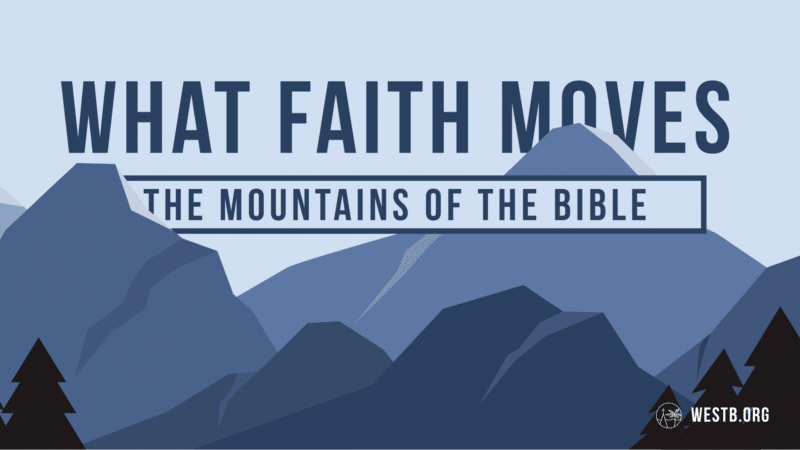A Mountain of Blessings and Challenges
Series: What Faith Moves: The Mountains of the Bible
Sermon Title: Blessed: A Mountain of Blessings and Challenges
Speaker: Jonathon Jankovich
Date: August 18,, 2024
Reflect
- Have you ever experienced a moment in life when you felt truly blessed, even in difficult circumstances? What was that experience like?
- When you hear the word “blessed,” what comes to mind? How has your understanding of being blessed changed over time?
Encounter
- In Matthew 5:3, Jesus says, “Blessed are the poor in spirit, for theirs is the kingdom of heaven.” How do you interpret “poor in spirit,” and why does Jesus consider this a blessing?
- Reflect on the concept of mourning in Matthew 5:4. How does mourning over our sins lead to comfort, according to the sermon and related passages like 2 Corinthians 7:8-10?
- Jesus taught that those who hunger and thirst for righteousness will be satisfied (Matthew 5:6). What does it mean to hunger and thirst for righteousness, and how can we cultivate this desire in our spiritual lives?
Transform
- How can we, as individuals and as a church, shift our focus from seeking worldly blessings to pursuing spiritual blessings as described in the Beatitudes?
- In what ways can we embrace persecution or opposition for the sake of Christ, as mentioned in Matthew 5:11-12, and how can we support each other in standing firm in our faith?
Additional Discussion Questions
- How do the Beatitudes challenge the way we typically view success and happiness in our culture today?
- What steps can we take to develop a deeper hunger and thirst for righteousness in our daily lives?
- How does understanding the true meaning of being “blessed” change the way you view your current circumstances, especially in difficult times?
Interesting Facts and Tidbits
- Mount Gerizim and Mount Ebal: In Deuteronomy 27-28, Mount Gerizim is associated with blessings and Mount Ebal with curses, highlighting the covenantal relationship between God and Israel. These mountains symbolize the consequences of obedience and disobedience to God’s commandments.
- The Beatitudes: The term “Beatitude” comes from the Latin word beatus, meaning blessed or happy. The Beatitudes in Matthew 5:1-12 turn conventional wisdom upside down by associating blessings with poverty, mourning, meekness, and persecution.
- Makarios: The Greek word translated as “blessed” in the Beatitudes is makarios, which conveys a sense of deep, inner joy and contentment that comes from being in right relationship with God.
Related Passages
- Deuteronomy 27-28 (Mount Gerizim and Mount Ebal): These chapters outline the blessings for obedience and curses for disobedience, providing the Old Testament background for understanding the significance of blessings and curses in the life of Israel.
- 2 Corinthians 7:8-10 (Godly Grief and Repentance): This passage explains the difference between godly grief, which leads to repentance and salvation, and worldly grief, which leads to death. It ties directly to the Beatitude about mourning.
- Isaiah 57:15 (God Dwells with the Contrite and Lowly): This verse emphasizes God’s presence with those who are humble and contrite in spirit, which aligns with the Beatitude about being poor in spirit.
- Psalm 34:18 (The Lord is Close to the Brokenhearted): This psalm speaks to God’s nearness to those who are brokenhearted and crushed in spirit, offering comfort to those who mourn.
- Romans 5:1-2 (Peace with God through Faith): These verses highlight the peace and joy that come from being justified by faith, connecting with the themes of righteousness and being blessed in the Beatitudes.

